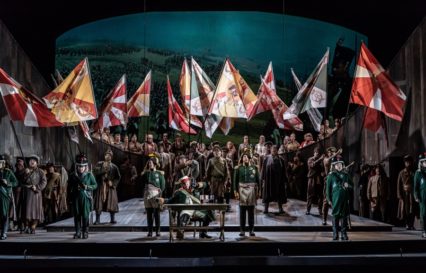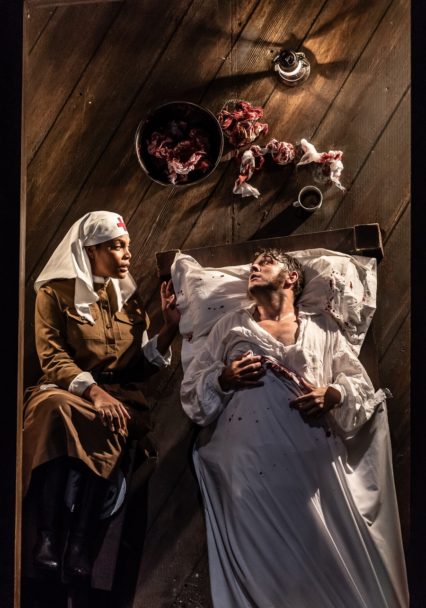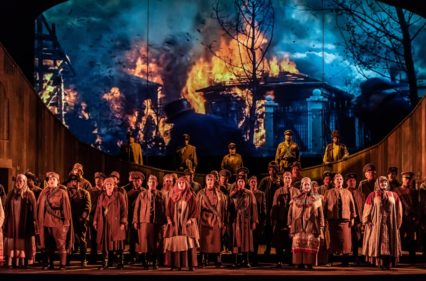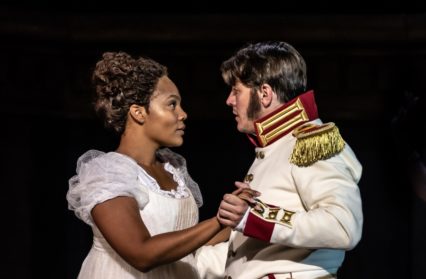David Pountney of the Welsh National Opera hosts a new production of Prokofiev‘s War and Peace, a socio-historical milieu narrative.

Characters in opera frequently sing themselves to death when they’re not reflecting on life’s vicissitudes. Their socio-historical milieu is important but the focus is on them as individuals within it. When their story is taken from a momentous literary text with a cast and events queuing to be included, such as a Tolstoy epic, the librettist’s task might be considered impossible. The team assembled to stage David Pountney’s production of Prokofiev’s War and Peace for Welsh National Opera is immense; even then, most of the cast take on more than one role. They sing the libretto written by the composer’s wife, Mira Mendelson, with tweaks by Pountney and the Prokofiev scholar, Rita McAllister, who also provides the English translation. The score is a new critical edition created in tandem by McAllister and her colleague Katya Ermolaeva. Pountney’s is a gripping spectacle, with the audience having to make allowances for what at times can make patriotism and celebration sound like the thunderous overtures of propaganda.
Any such reaction has to be tempered by reality, as the Russophile Pountney would readily agree. Napoleon’s invasion of Russia, the depredations it caused, and his famous retreat in the snows were echoed in the German invasion 130 years later, a repetition of history, including the enemy’s defeat, that could have been marked in no other way. That Prokofiev’s stand-and-deliver choruses can be employed to celebrate less heroic situations in the subsequent history of Russia is nothing to do with him or his music. As Shostakovich showed, albeit, in compositions lacking the tell-tale voice, the sentiments of pure music can be ambivalent. In this opera, Prokofiev was expressing a nation’s genuine emotions. In Britain, any remotely equivalent music has reflected imperial ambition; and the front-line defence of Russia involved the many, not the few, whether armed with cannon or pitchforks.

The ‘news from Vilnius’ of Napoleon’s arrival on Russian soil is dropped almost inconsequentially into the first and domestic half of the opera, the so-called ‘Peace’ of WNO’s synopsis. The landowning classes, ironically in thrall to French culture, are engaged in the trials of love and rejection with much singing of breadth and sincerity from Lauren Michelle as Natasha, Jonathan McGovern (Andrei), Mark Le Brocq (Pierre), Jurgita Adamonyte (Helène), Adrian Dwyer (Anatole), and others. On a spacious bear-hug set designed by Robert Innes Hopkins for a WNO production of In Parenthesis by Iain Bell, and a cinematic backdrop about to come into its own, these personal utterances and exchanges could have become lost. But Pountney, ever the stage craftsman in tune with each note of the music, distracts attention from it: for examples, in making the body language eloquent during intimacies; constricting the area to a downstage vignette for the encounter between Andrei and Natasha at her bedroom window; and placing characters around the rim of Bell’s hemispherical walls like putti from Mantegna’s 15th-century Camera degli sposi, his painting of a ceiling oculus.
Small touches, but Pountney brooks no superfluous detail. It has to work and it does, not least in the way that the lyric scenes of the opera glide into one another, as they do in Tchaikovsky’s Eugene Onegin, and how the absence of some characters and plot developments are not missed, or not much in the story’s transformation as music-theatre. The nicest of nice touches is to have the character of Tolstoy on stage at the beginning, writing at his desk, his Cyrillic script (Yelena Gedge) back-projected. Gradually he is surrounded by the people he is creating, who turn to the audience as the faultless WNO chorus for a tremendous opening salvo, the opera’s epigraph.
The salon habitués in the first half are rapidly overtaken by the consequences of that news from Vilnius. We see them, or most of them dragged into the war and the war effort. The huge gobbets ripped from Tolstoy’s original include his treatment of the Battle of Austerlitz; but, in a master-stroke, Pountney wages war in upstage video backdrops, including scenes from the 1966 Russian film of War and Peace by Sergei Bondarchuk, with their almost documentary realism and their action sometimes slowed. It’s brilliant; but it does not deflect from what’s happening beneath it or from the exertions of conductor Tomáš Hanus and his orchestra in contouring the marvellous girth of Prokofiev’s scoring, its depths gleefully plumbed.
The backdrop of wooden Moscow houses lies dormant until the consequences of the beleaguered Russian army’s scorched earth plan when it catches alight with such ferocity that one begins to wonder if it’s not an over-ambitious stage conflagration. The part played in this development by ‘his Highness’ Kutuzov, the eccentric Russian army commander given an added twist by Simon Bailey (Kutuzov’s a character whose capacity for attracting respect transcends the appearance of his incapacity for making war), is again typical of the attention to minutiae, further employed in creating personalities of Count Rostov, Sonya, and Denisov, for example, sung respectively and with a commitment by James Platt, Samantha Price, and David Stout, each playing more than one part; Stout doubles Napoleon as well as two other characters. As the bespectacled Pierre wanders on his Tolstoy/Everyman soul search, Russia and France troop from left to right and right to left downstage in increasing degrees of icy desperation. Later, there’s to be much flag-waving, not least in a further backdrop video of windblown banners in multiples.

If there are faults, they are not Pountney’s. Many dying operatic heroes and heroines are a long time about it, not least Andrei ministered to by Natasha who has joined the Red Cross. Here Pountney is again visionary in echoing that first coming together of the couple downstage and presenting the scene through the same window opening but viewed from above. As with much else in the production, the visual is keenly balanced by the vocal and the dramatical. The ball scene early draws attention to the production’s choreography (from the ever-dependable Denni Sayers), and not just in tripping to Prokofiev’s danceable episodes: there’s a slightly outrageous ensemble of armed Russian ‘soldiers’ in catsuits, who seem to have wandered on to the stage from a decadent cabaret act next door, but on such a canvas mild obtrusion is forgivable when it’s not a relief. Costume designer Marie-Jeanne Lecca does traditional and outré with aplomb, as well as mixing historical garb.
Pountney will soon be leaving WNO as artistic director. More’s the pity. Of all his predecessors, few have given their names so deservedly to an era. Operagoers will long talk of the Pountney reign, and his War and Peace will be remembered as one of its many high-water marks.
The Welsh National Opera hosts several theatrical productions.
Header photo of Lauren Michelle (Natasha) and Jonathan McGovern (Andrei) by Clive Barda.
Nigel Jarrett is a former daily newspaperman and a regular contributor to the Wales Arts Review and other publications, including Jazz Journal and Acumen poetry magazine. He was formerly music critic of the South Wales Argus. He is a poet, novelist, and story writer. His first collection of stories, Funderland, was warmly reviewed in the Independent, the Guardian, and the Times, and long-listed for the Edge Hill Prize. His latest collection is Who Killed Emil Kreisler?. He is a winner of the Rhys Davies prize for short fiction and, in 2016, the inaugural Templar Shorts award. This year sees the publication of his short fiction pamphlet, A Gloucester Trilogy.



 Enjoyed this article? Support our writers directly by buying them a coffee and clicking this link.
Enjoyed this article? Support our writers directly by buying them a coffee and clicking this link.







